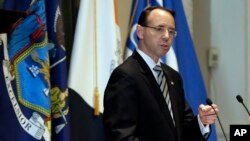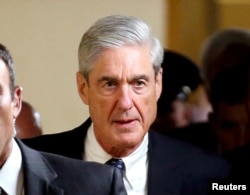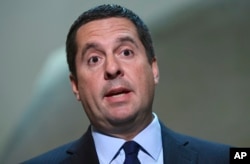President Donald Trump declined to say Tuesday whether he had confidence in Deputy Attorney General Rod Rosenstein, escalating pressure on the Justice Department as his White House negotiated rare access to classified documents for his congressional allies.
Asked before a private meeting with the president of South Korea if he had confidence in Rosenstein, who is overseeing the special counsel's Russia investigation, he asked reporters to move on to another question.
"Excuse me, I have the president of South Korea here," Trump said. "He doesn't want to hear these questions, if you don't mind."
The comments came just before White House press secretary Sarah Sanders announced that a meeting to allow House Republicans to review highly classified information on the Russia probe would happen Thursday.
Sanders said FBI Director Christopher Wray, National Intelligence Director Dan Coats and Justice Department official Edward O'Callaghan would meet with House Intelligence Committee Chairman Devin Nunes of California and House Oversight and Government Reform Chairman Trey Gowdy of South Carolina.
Push by Nunes
Nunes, an ardent Trump supporter, has been demanding information on an FBI source in the Russia investigation, according to the Justice Department. And Trump has taken up the cause as the White House tries to combat the threat posed by special counsel Robert Mueller's investigation into potential ties between Russia and the Trump campaign.
Trump said Tuesday it would be a "disgrace" to the country if it's shown that the FBI had spies in his campaign, and that would "make probably every political event ever look like small potatoes."
In a tweet on Sunday, Trump demanded that the Justice Department investigate whether the FBI infiltrated his presidential campaign and "if any such demands or requests were made by people within the Obama Administration!"
Trump's demand alarmed some observers, who felt it not only violated presidential protocol but also could have a chilling effect on federal law enforcement or its use of informants.
Expansion of open probe
In response to Trump's tweet, the Justice Department said it would expand an open, internal investigation into the ongoing Russia probe by examining whether there was any politically motivated surveillance. The White House then said Monday that Trump Chief of Staff John Kelly would organize the meeting to review the documents. But Sanders said no White House staffers — including Kelly — would be present at Thursday's meeting.
With the demand, Trump entered into the realm of applying presidential pressure on the Justice Department regarding an investigation into his own campaign — a move few of his predecessors have made. He made it amid days of public venting about the special counsel investigation, which he has deemed a "witch hunt" that he says has yielded no evidence of collusion between his campaign and Russia.
In response, the Justice Department moved to defuse the confrontation by asking its watchdog to investigate whether there was inappropriate surveillance.
"If anyone did infiltrate or surveil participants in a presidential campaign for inappropriate purposes, we need to know about it and take appropriate action," Rosenstein said in a statement announcing the move.
The Justice Department had originally rejected the request from Nunes, saying his request for information "regarding a specific individual" could have severe consequences, including potential loss of human life.
The department said then that the White House had signed off on its letter, but Nunes wasn't satisfied, and continued to pressure DOJ officials.
FBI informant
The New York Times was the first to report that the FBI had an informant who met several times with Trump campaign officials who had suspicious contacts linked to Russia.
The Justice Department's internal probe began in March at the request of Attorney General Jeff Sessions and congressional Republicans. Sessions and the lawmakers urged Inspector General Michael Horowitz to review whether FBI and Justice Department officials abused their surveillance powers by using information compiled by Christopher Steele, a former British spy, and partly paid for by Democrats to justify monitoring Carter Page, a former campaign adviser to Trump.
Horowitz said his office would look at those claims as well as communications between Steele and Justice and FBI officials.
Sunday was not the first time that Trump accused his predecessor of politically motivated activity against him.
Without substantiation, Trump tweeted in March 2017 that former President Barack Obama had conducted surveillance the previous October at Trump Tower, the New York skyscraper where Trump ran his campaign and transition and maintains a residence.
Former FBI Director James Comey later testified to Congress that internal reviews found no information to support the president's tweets. Trump fired Comey over the FBI's Russia investigation.






